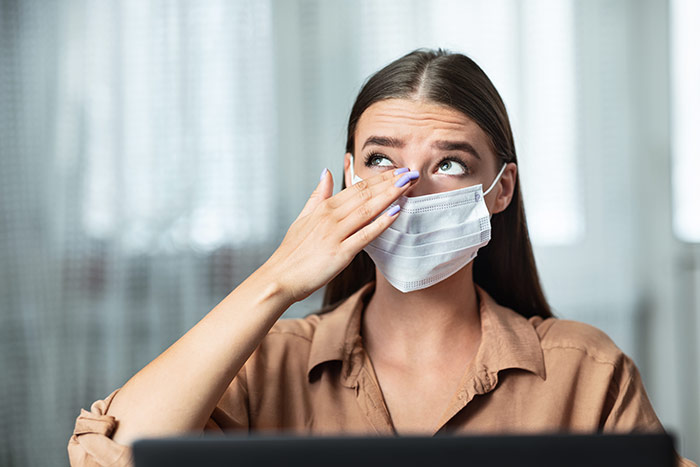Unmasking Dry Eye During COVID-19
Whether we’re heading to the bank, the grocery store, or the doctor, mask-wearing has become part of a daily routine for many of us. While masks have been shown to help reduce transmission of COVID-19 (a recent study by the CDC suggests a mask mandate reduced COVID cases in Arizona by as much as 75%) and offers another opportunity to stylishly accessorize, eye doctors have begun to hear reports that regular mask-wearing may be causing some ocular discomfort, which we’ll continue to address below.

Is My Mask Making My Eyes More Dry?
If you feel like regular mask-wearing has left you with dry, itchy irritated eyes, you’re not alone. In fact, a new name has been given to this phenomenon: mask-associated dry eye (MADE). The cause? When someone wears a loose-fitting mask, exhaled air can be pushed upwards, drying out the eyes over time. For those of us who wear glasses, this can also lead to pesky fogging. Also, some masks can tug down on the lower eyelids, which leads to less blinking and thus, less tears, depriving your eyes of valuable lubrication. In the age of COVID-19, this can be particularly troublesome as rubbing your eyes with unwashed hands can lead to infection.
3 Ways To Manage Mask-Associated Dry Eye
- If the mask fits: Since it’s upward airflow that is the main culprit of dryness, masks with a pliable nose-wire are more fitting and ideal for stopping MADE before it begins. Masks can also be taped at the top to block airflow.
- Try eye drops: Eye drops are a simple over-the-counter solution to relieving the discomfort caused by mild cases of dry eye.
- Practice good eye-geine: Routine steps to managing dry eye still apply. Make sure you’re blinking enough throughout the day, take regular breaks when spending a lot of time on digital devices, and limit your eyes’ exposure to elements that can dry them out, such as air conditioning.
Whatever You Do, Don’t Ditch The Mask
Until we develop and distribute a vaccine, masks remain one of our greatest weapons in the fight against COVID-19. “Mask-associated dry eye can be a rather bothersome side effect of trying to protect yourself and others from infection from coronavirus,” says Dr. Jessica Boeckmann, Cataract Surgeon and Dry Eye Specialist. “Fortunately, with a well-fitting mask and use of lubricating eyedrops, these symptoms can often be easily controlled.”
If you’re experiencing discomfort while wearing a mask, be sure to discuss it with your eyecare provider just as you would any other eye concern. And don’t forget to blink!